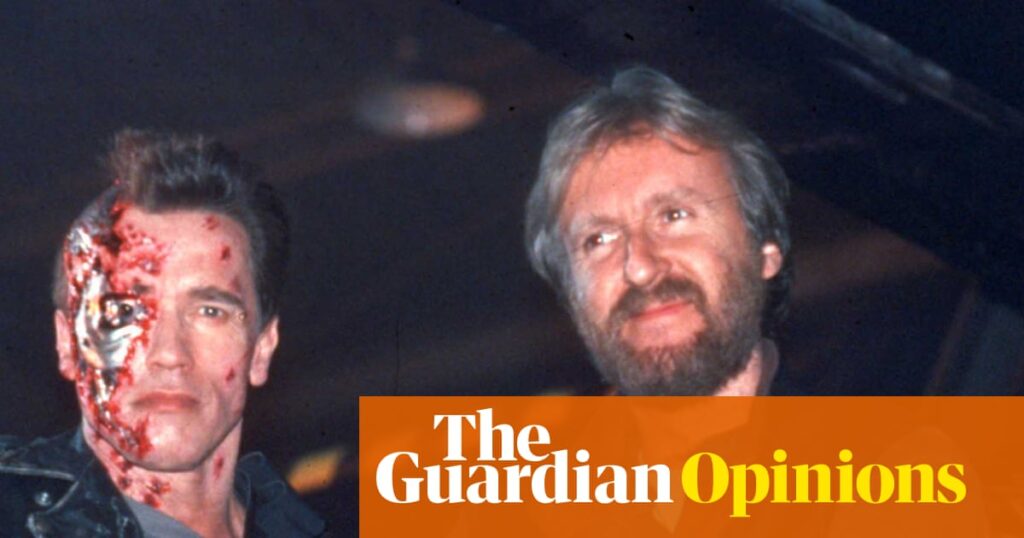James Cameron has a confession: he can’t write Terminator 7. And it’s not because Hollywood won’t let him, as he’s too busy making the new Avatar – it’s because reality keeps nicking his plotlines. “I’m at a point right now where I have a hard time writing science-fiction,” Cameron told CNN this week. “I’m tasked with writing a new Terminator story [but] I don’t know what to say that won’t be overtaken by real events. We are living in a science-fiction age right now.”
It’s an understandable quandary for the veteran film-maker. Back in 1984, when the first Terminator movie came out, there was genuine shock value in the idea of a killer robot travelling through time from a future in which the wretched dregs of humanity survive in a chrome-plated hellscape dominated by their robot overlords. These days, the only far-fetched part of the movie is the bit where the T-800 turns up alone and completely naked, as opposed to arriving flanked by a swarm of AI-guided drones.
We may not have achieved time travel just yet, but we do have artificial intelligences capable of quietly teaching themselves sarcasm, city-wide facial recognition, and robot learning systems deciding who lives and dies. That’s the heart of Cameron’s problem: in 1984, Skynet was a terrifying piece of speculative fiction. In 2025, it’s basically LinkedIn with nukes. The creeping dread of AI isn’t a future shock any more; it’s the news cycle. From AI-powered spyware in our pockets to deepfake scams and voice-mimicking chatbots, the Terminator franchise no longer has the monopoly on making you want to hurl your hi-tech personal possessions into the sea.
Cameron seems to be caught between a rock and a hard place here, especially as this grand old sci-fi saga hasn’t exactly been blowing anyone’s CPU in well … decades. Terminator: Dark Fate, which the saga’s creator at least had a basic hand in developing, struggled at the 2019 box office despite the return of Linda Hamilton and a storyline that tried to mix the franchise’s classic “unstoppable hunter” formula with a reunion tour for its surviving stars. Before that, we have to go all the way back to 1991’s Terminator 2: Judgment Day to find a film that audiences really warmed to. The wilderness years between those two movies were littered with sequels that were too bleak, or too daft.
What Cameron should be looking for is a complete system reboot to reinvigorate the saga in the way Prey brought fans back to Predator and Alien: Romulus restored interest in slimy Xenomorphs. All evidence suggests that the 70-year-old film-maker is far more interested in the current challenges surrounding AI, superintelligences and humankind’s constant efforts to destroy itself, which doesn’t exactly lend itself to the sort of back-to-basics, relentless-monsters-hunt-a-few-unlucky-humans-for-two-hours approach that has worked elsewhere. The challenge here seems to be to fuse Terminator’s core DNA – unstoppable cyborgs, explosive chase sequences, and Sarah Connor-level defiance – with the occasionally rather more prosaic yet equally scary existential anxieties of 21st-century AI doom-mongering.
So we may get Terminator 7: Kill List, in which a single, battered freedom fighter is hunted across a decimated city by a T-800 running a predictive policing algorithm that knows her next move before she does. Or T7: Singularity’s Mom, in which a lone Sarah Connor-type must protect a teenage coder whose chatbot will one day evolve into Skynet. Or Terminator 7: Terms and Conditions, in which humanity’s downfall comes not from nuclear warfare but from everyone absent-mindedly agreeing to Skynet’s new privacy policy, triggering an army of leather-clad enforcers to collect on the fine print.
Or perhaps the future just looks terrifying enough without Cameron getting involved – which, rather worryingly for the future of the franchise, seems to be the director’s essential point. Then again, if anyone can make the apocalypse feel even worse than it already does, it’s the man who previously convinced us that autonomous drones would hunt humans from the sky and that machines would learn to think and kill for themselves. We should have confidence he can do it again.

